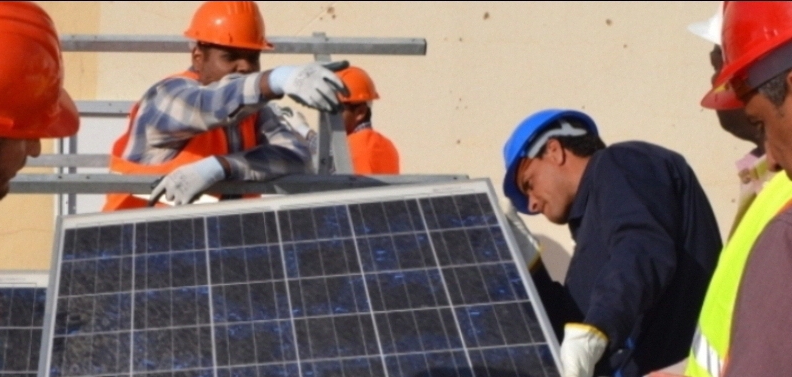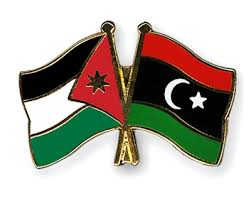By Sami Zaptia.

London, 29 April 2019:
GIZ, the German development cooperation, together with its Libyan partners, under the lead of the Libyan Ministry of Labour and Capacity Building, is working to provide young Libyans with technical and life skills, particularly in potential growth sectors like renewable energies.
The project, ‘‘Promoting Employment and Private Sector Development in Libya’’, is € 5 million project financed by the German Federal Ministry for Economic Cooperation and Development (BMZ). It started last year and is scheduled to continue until 2022.
The renewable energies sector is seen as a priority sector for both employment opportunities and to complement the energy needs in times of frequent electricity cuts in Libya.
The overall objective of the project, GIZ say, is for Libyans to benefit from a stronger private sector and improved training opportunities. This, it adds, increases employment and income for many Libyans. The project creates employment and income opportunities, especially for young people including training and coaching in entrepreneurial activities or in setting up a business. The offers are aimed particularly at start-ups and small businesses. GIZ also promotes the development of local networks to promote business. GIZ also say that with its partners it addresses disadvantaged groups such as internally displaced people (IDPs), the war-disabled and women.
The project also aims to improve worker training – especially in areas with growth potential such as the manufacturing industry, renewable energies, information technology, electrical engineering/electronics or construction. To this end, teachers are trained in order to increase the range of training on offer and improve the quality of teaching.
GIZ also reveals its assessment of the current Libyan situation. It says that the economic situation in Libya is dire. The country has one of the highest unemployment rates in the world – about half of all young people and a quarter of women are unemployed. It says that there are hardly any small or medium-sized enterprises, as Libya has had a centrally planned economy. There is overemployment in the public sector. Young people, in particular, who are entering the labour market are therefore unable to find employment, GIZ concludes.
Through quality training that meets international standards, GIZ supports trainees from different Libyan training institutions, to equip them with valuable skills that increases their chances of earning their own income and to have a good and secure life. On the current training project, GIZ says that it is working with the Libyan Korean Centre, which is one of several vocational centres that provides training for job seekers, specifically young people, to prepare them for the job market.
GIZ says the Libyan Ministry of Labour and Capacity Building has identified renewable energies as a priority sector for both employment opportunities and to complement the energy needs. It says that Germany has a wealth of experience, technological expertise and innovative application concepts in the field of renewable energy and energy efficiency. Renewable energy systems need special know-how to be installed, operated and maintained effectively. Therefore, and in cooperation with Libyan training institutions, GIZ assesses the training needs for young technicians and skilled personnel, develops curricula with them, and advises Libyan training institutions on introducing practical training programmes aligned with international standards.
GIZ assists in the training provision of renewable energy – with focus on photovoltaics and solar pumping – for the benefit of the Libyan youth as part of the “Promotion of Employment and Economic Development” programme.
The Libyan Korean Centre is one of two centres under the auspices of the Ministry of Labour and Capacity Building, that the GIZ programme team works with directly in training the Libyan youth. GIZ supports the Libyan Korean Centre in opening a training department specifically for renewable energies – photovoltaic and solar pumping – the first of its kind in Libya.
This support consists of the training of trainers from technical and vocational training institutions like the Libyan Korean Centre, with whom GIZ jointly develops a practical renewable energy curriculum that meets international standards and norms.
Complementary equipment to selected centres also includes a training device to simulate the production of energy for solar pumps and for off-grid systems tailored to the specific situation in Libya. Young people are trained to install, maintain and repair photovoltaic devices. This, among other things, will enable the trainees to install solar panels in clinics, hospitals, schools, or even private households. Solar panels capture solar energy, transform them into electricity, and thereby provide energy during times of power cuts.
GIZ says the first successful training of Libyan trainers has been organized in Tozeur, Tunisia with the Higher Institute of Technological Studies of Tozeur (ISET Tozeur). This training included trainers from the Libyan Korean Centre, but also from The (Libyan) Centre for Solar Energy Research and Studies (CSERS), Renewable Energy Authority of Libya (REAOL), Higher Institute of Comprehensive Occupations, the College of Industrial Technology in Misrata and Zliten Technical Organization.
GIZ says that the Libyan Ministry of Labour and Capacity Building is planning to announce in autumn a training schedule that will be organized on an ongoing basis. Each intensive and practical training course will last around three months, and offers the opportunity to around 20 participants.
The Libyan Korean Centre specifically, will provide training in solar-heating (warm water), photovoltaics based on a hybrid off grid system, and solar pumping. At the end of the training the participants will have acquired skills to use renewable energy technologies, will know the requirements for setting up such technologies, and will be able to install and maintain PV and CES systems. GIZ says that the commitment of the newly-trained trainers, is an asset for the anchoring of the renewable energy culture in Libya and consequently the promotion of employment in this sector.
GIZ reports that it has been working in Libya since 2005 and has been carrying out projects on behalf of the German Government since 2011, with a break in 2014 due to the militia war. In view of the fragile security situation in the country, the ‘Libya hub’ is managing projects from Tunisia for the time being. GIZ runs an office in Tripoli for the work on the ground. Currently it has 25 Libyan employees working in-country.
Overall, GIZ has a wide remit in Libya. It provides support for Libya in three areas in cooperation with the internationally recognised Faiez Serraj Presidency Council and Government of National Accord:
· Municipal development and decentralisation
· Promotion of economic development and employment
· Facilitation of dialogue and strategy development
The main financing party is the German Federal Ministry for Economic Cooperation and Development (BMZ), and one project is co-financed by the European Union.
GIZ advises various bodies, including the Ministry of Local Governance, on state decentralisation and supports selected partner municipalities. Focal points include effective local government systems for improved basic public services, employment growth and better inclusion of civil society groups.
Public servants receive training on subjects such as urban planning, project management and financial management. Training centres train teachers for vocational education centres and counselling centres for women. GIZ and its partners also promote the local processing and trade of agricultural products such as olives and dates. Environmental laboratories are also being set up to test the quality of drinking water and food.
GIZ says that in the interests of positive social and economic development, it is supporting Libya in developing a consensual vision for its economic future through participatory and inclusive dialogue and discussion processes. The methods adopted to this end include fact-finding trips, public discussion events and joint workshops with representatives of the state administration, municipalities, universities and non-governmental organisations, all with a view to strengthening cohesion in society.










